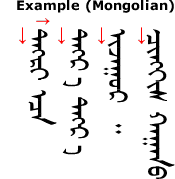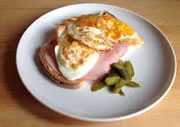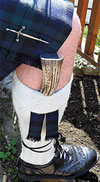
Last week a visitor to Omniglot asked me whether there is a single word in English that means writing direction, i.e. the direction in which writing systems are written. The Latin alphabet, for example, is written from left to right in horizontal lines, as are many other writing systems, while writing systems like Arabic and Hebrew are written from right to left in horizontal lines, and a few writing systems, such as traditional Mongolian and Manchu, are written from top to bottom in vertical columns running from left to right – other directions are available.
On Wikipedia I found the word directionality, and I found that there are more precise words for this concept in German and Dutch: Schreibrichtung / Schriftrichtung and Schrijfrichting. On the W3C site I found the term script direction.
The lack of a single-word term in English is partly because in English noun phrases are usually written as separate words, unlike in German and Dutch, where they are often written as single words.
I came up with some alternative possible terms for this phenomenon: scribeway / scribe way, scribepath / scribe path, script direction, script path, script way, script course, script orientation, or using Greek rather than Latin/Germanic roots: graphodromos, or grammadromos (dromos = road in Greek), or mixing Latin and Greek roots: scriptodromos / grammadromos.
What is writing direction called in other languages? Are there any others which use a single word.



